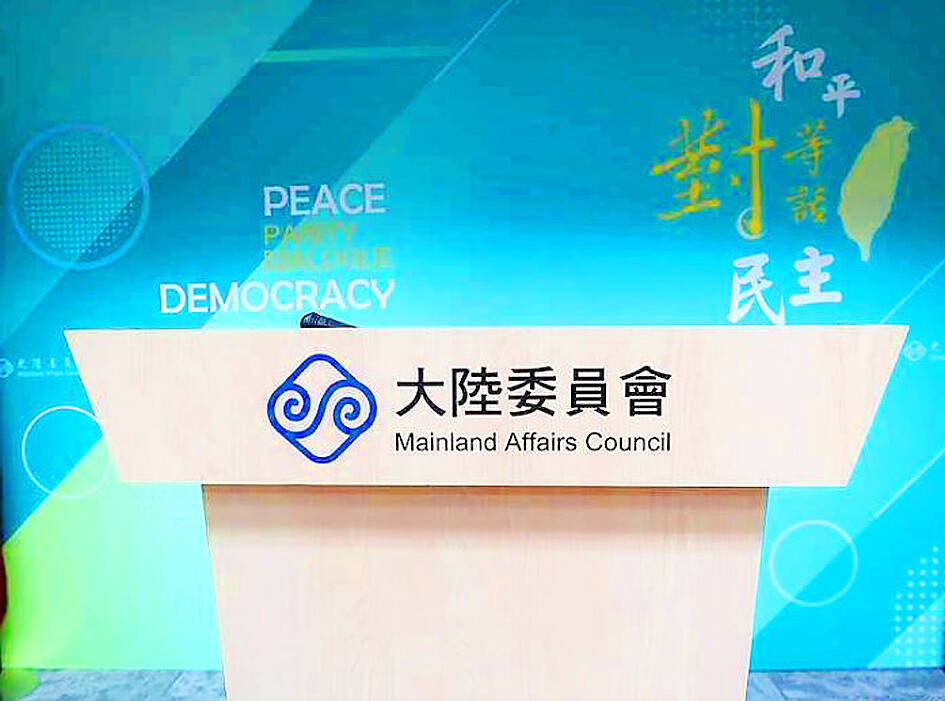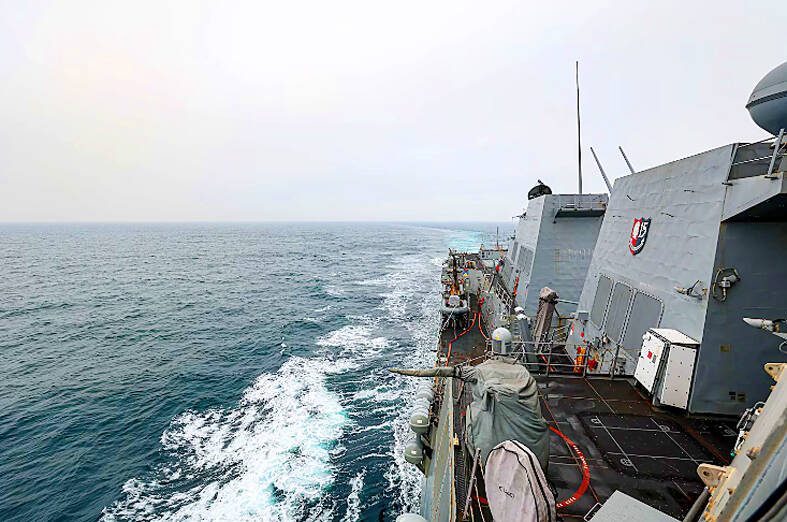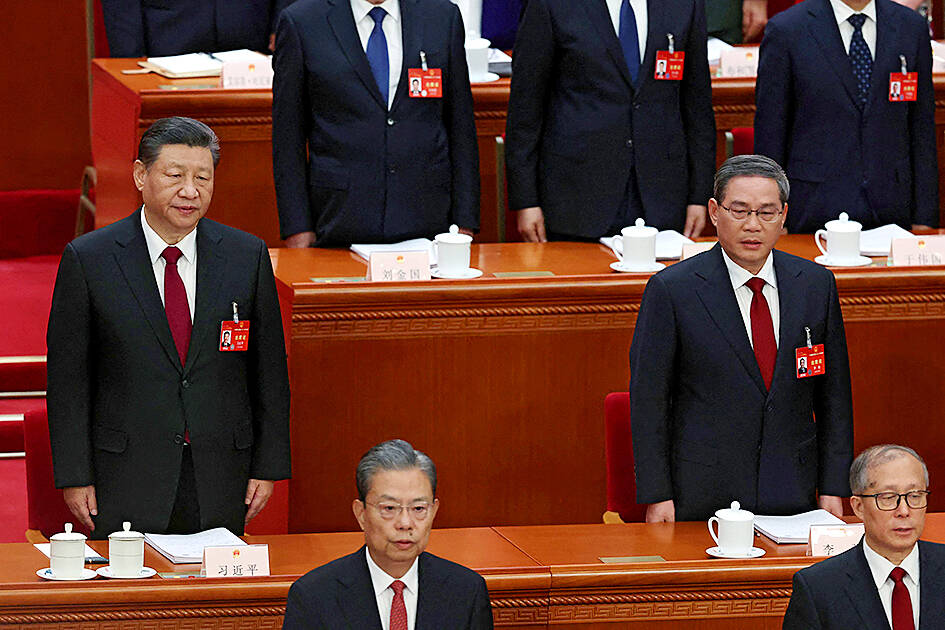The Mainland Affairs Council (MAC) yesterday urged China to accept that the two sides of the Taiwan Strait are not subordinate to each other, after Beijing hardened its stance on Taiwan in a report at the opening of China’s National People’s Congress.
Chinese Premier Li Qiang (李強), who delivered the report, reiterated Beijing’s “one China” principle, the so-called “1992 consensus” and its firm opposition to “any separatist activities seeking Taiwanese independence and interference from foreign powers.”
China’s rubber-stamp parliament also dropped the descriptor “peaceful” from the report’s call for “reunification,” adding instead that it wants to “be firm” in doing so.

Photo: Chung Li-hua, Taipei Times
Although it is not the first time China had omitted “peaceful” from such reports, the change of language is being closely watched as a possible sign of it taking a more assertive stance toward Taiwan.
The “1992 consensus” — a term that former Mainland Affairs Council chairman Su Chi (蘇起) in 2006 admitted making up in 2000 — refers to a tacit understanding between the Chinese Nationalist Party (KMT) and the Chinese Communist Party that both sides of the Strait acknowledge that there is “one China,” with each side having its own interpretation of what “China” means.
The MAC said in a statement that Taiwan would work to maintain cross-strait peace and the “status quo,” and urged Beijing to create healthy cross-strait exchanges and interaction through dialogue without political preconditions.

Photo: Screen grab from the Web site of US Navy’s 7th Fleet
Meanwhile, the Ministry of Foreign Affairs said that China was singing the same old tune, adding that any attempt to distort Taiwan’s sovereignty cannot change the “status quo.”
Li also said that China would boost its defense spending by 7.2 percent this year, fueling a military budget that has more than doubled under Chinese President Xi Jinping’s (習近平) more than a decade in office.
The increase mirrors the rate presented in last year’s budget and again comes in above the government’s economic growth forecast for this year.

Photo: AFP
Li Mingjiang (李明江), an associate professor of international relations at Singapore’s S. Rajaratnam School of International Studies (RSIS), said that despite a struggling Chinese economy, Taiwan is a major consideration for Beijing’s defense spending.
“China is showing that in the coming decade it wants to grow its military to the point where it is prepared to win a war if it has no choice but to fight one,” Li said.
Since Xi became president and commander-in-chief, the defense budget has ballooned to 1.67 trillion yuan (US$232 billion) this year from 720 billion yuan in 2013.
The increase in military spending has consistently outpaced the nation’s annual GDP growth target during his time in office. Economic growth is expected to increase 5 percent this year.
The defense budget is closely watched by China’s neighbors and Washington, which is wary of Beijing’s strategic intentions and the development of its armed forces.
Based on data from the International Institute for Strategic Studies in London, this year’s budget marks the 30th consecutive year of Chinese defense spending increases.
James Char (蔡志祥), a research fellow at RSIS, said that despite the defense budget outpacing GDP growth, it had remained about 1.3 percent of overall GDP in the past decade and had put no stress on the national coffers.
“Of course, the country’s longer-term economic fortunes will determine whether this can be sustained,” Char said.
In Taipei, the Ministry of National Defense did not immediately respond to a request for comment on China’s military budget increase.
However, Minister of National Defense Chiu Kuo-cheng (邱國正) said that the nation’s armed forces would increase the number of missile drills they hold this year.
China has in the past few years increased military activities near Taiwan, including almost daily incursions into its air defense identification zone.
Speaking on the sidelines of a plenary session at the Legislative Yuan, Chiu said that the ministry would increase the frequency of missile drills in response to a change in “enemy threat.”
In the past, missile drills had only been held at certain times of the year to limit its impact on aviation and everyday life, he said.
“We must consider boosting our training in response to the enemy’s situation,” he said, adding that the amount of ammunition the drills use would be in line with regulations.
In other news, the Arleigh Burke-class guided missile destroyer USS John Finn yesterday conducted a routine south-to-north transit of the Taiwan Strait, the US Navy said.
“The transit occurred through a corridor in the Taiwan Strait that is beyond any coastal state’s territorial seas,” the US Seventh Fleet said in a statement. “Within this corridor, all nations enjoy high-seas freedoms of navigation, overflight and other internationally lawful uses of the sea related to these freedoms.”
It added that US ships have transited between the South China Sea and the East China Sea via the Taiwan Strait for many years.
The US and its Western allies have increased crossings by naval vessels in the Strait and the disputed South China Sea to reinforce that both are international waterways.
The defense ministry said it had tracked activity in “the surrounding sea and airspace” during the transit, adding that the “situation was normal.”
Beijing dismissed the latest transit as “public hype,” saying that its navy and air force had trailed the US warship’s “entire course.”
Additional reporting by Yang Hsiao-ju and AFP

MORE VISITORS: The Tourism Administration said that it is seeing positive prospects in its efforts to expand the tourism market in North America and Europe Taiwan has been ranked as the cheapest place in the world to travel to this year, based on a list recommended by NerdWallet. The San Francisco-based personal finance company said that Taiwan topped the list of 16 nations it chose for budget travelers because US tourists do not need visas and travelers can easily have a good meal for less than US$10. A bus ride in Taipei costs just under US$0.50, while subway rides start at US$0.60, the firm said, adding that public transportation in Taiwan is easy to navigate. The firm also called Taiwan a “food lover’s paradise,” citing inexpensive breakfast stalls

TRADE: A mandatory declaration of origin for manufactured goods bound for the US is to take effect on May 7 to block China from exploiting Taiwan’s trade channels All products manufactured in Taiwan and exported to the US must include a signed declaration of origin starting on May 7, the Bureau of Foreign Trade announced yesterday. US President Donald Trump on April 2 imposed a 32 percent tariff on imports from Taiwan, but one week later announced a 90-day pause on its implementation. However, a universal 10 percent tariff was immediately applied to most imports from around the world. On April 12, the Trump administration further exempted computers, smartphones and semiconductors from the new tariffs. In response, President William Lai’s (賴清德) administration has introduced a series of countermeasures to support affected

CROSS-STRAIT: The vast majority of Taiwanese support maintaining the ‘status quo,’ while concern is rising about Beijing’s influence operations More than eight out of 10 Taiwanese reject Beijing’s “one country, two systems” framework for cross-strait relations, according to a survey released by the Mainland Affairs Council (MAC) on Thursday. The MAC’s latest quarterly survey found that 84.4 percent of respondents opposed Beijing’s “one country, two systems” formula for handling cross-strait relations — a figure consistent with past polling. Over the past three years, opposition to the framework has remained high, ranging from a low of 83.6 percent in April 2023 to a peak of 89.6 percent in April last year. In the most recent poll, 82.5 percent also rejected China’s

PLUGGING HOLES: The amendments would bring the legislation in line with systems found in other countries such as Japan and the US, Legislator Chen Kuan-ting said Democratic Progressive Party (DPP) Legislator Chen Kuan-ting (陳冠廷) has proposed amending national security legislation amid a spate of espionage cases. Potential gaps in security vetting procedures for personnel with access to sensitive information prompted him to propose the amendments, which would introduce changes to Article 14 of the Classified National Security Information Protection Act (國家機密保護法), Chen said yesterday. The proposal, which aims to enhance interagency vetting procedures and reduce the risk of classified information leaks, would establish a comprehensive security clearance system in Taiwan, he said. The amendment would require character and loyalty checks for civil servants and intelligence personnel prior to